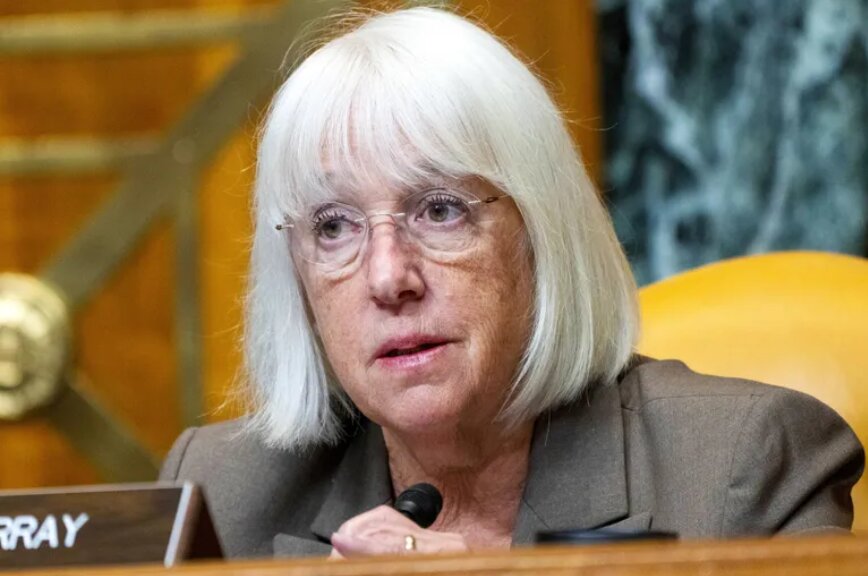
The U.S. Senate’s powerful appropriations chair “strongly” supports a new tax proposal to help save local news outlets.
U.S. Sen. Patty Murray of Washington, who is also Senate president pro tempore, said she’s all for using tax credits to help news outlets retain and add newsroom jobs.

The credits are proposed in the bipartisan Community News and Small Business Support Act, introduced July 19 in the House. A Senate version is being drafted and expected within a few months.
“I really strongly support that,” Murray said Tuesday during a meeting with The Seattle Times editorial board.
That’s a great endorsement from a key Senate leader as the news industry looks for federal support to prevent further layoffs and closures.
Tax credits would not give the government any say over what or how news is reported. But they would extend news industry support that began with postal subsidies in 1792 and continues today with programs like cable franchise agreements and public airwave usage that enable broadcast and cable TV.
Two newspapers a week are closing on average, according to research by Northwestern University’s Medill School, and nearly two thirds of newspaper newsroom jobs evaporated over the last 15 years.
The situation would be even worse if Murray hadn’t championed pension reforms helping newspaper publishers in 2019. That avoided crises at a number of smaller papers overwhelmed by pension liabilities, by allowing them to revalue the liabilities and giving them more time to cover shortfalls.
Murray said it’s critical to help local news outlets survive.
“Look, this is part of our democracy,” she said. “If we don’t have voices heard and we don’t hear other voices our democracy’s in trouble. This is something I care passionately about.”
Temporary tax credits to save newsroom jobs were proposed in 2020 and 2021, as the Local Journalism Sustainability Act, and drew strong bipartisan support.
A revised version, the Community News bill, was proposed last month by House Reps. Claudia Tenney, a New York Republican, and Suzan DelBene, a Washington Democrat.
The current bill would provide a tax credit up to $25,000 per newsroom job retained in the first year and up to $15,000 yearly over the next four years. It would also provide tax credits to small businesses advertising in local news outlets; they’d receive up to $5,000 in the first year and $2,500 the next four.
Washington’s other U.S. senator, Maria Cantwell, is expected to introduce a Senate version of the Community News bill later this year. Murray said Cantwell, as Commerce Committee chair, would take the lead but she will support the bill.
Cantwell introduced the Senate version of the Local Journalism Sustainability Act in 2021 and Murray co-sponsored it as well. The tax credits were bundled with post-pandemic spending packages but cut as the packages were winnowed down.
Meanwhile the news industry continues to dwindle.
Media layoffs reached a record high through May this year, according to employment firm Challenger, Gray & Christmas. Within the category of news, companies announced 1,972 layoffs through May, more than all the 1,808 layoffs the firm counted in 2022.
Murray said she’s hearing more and more from constituents concerned about losing their local news coverage.
“You turn on TV and it’s a national story and you’re like, ‘What’s happening in my backyard?’ ” she said. “I mean, it’s everywhere in all communities.”
The growing void of local coverage is clear when Murray traverses the state to discuss work she’s doing in the Capitol.
“It’s frustrating to me, as someone who really wants my constituents to know what’s going on, to not see anything, not even see a reporter able to come to any of our events to report back, good, bad or indifferent,” she said.
The local journalism crisis is also evident in Washington, D.C., where few local papers still have correspondents covering Congress.
“When I first went into the Senate there was like 19 or 20 reporters from Washington state. We have one now,” Murray said.
On Monday, Murray was in Whatcom County discussing an expansion of rural broadband service that she helped get funded. Congress provided $65 billion to expand broadband services in 2021, including a digital-equity program proposed by Murray to connect underserved areas and populations.
I think helping save local news outlets, for another $1.8 billion or so, complements the broadband work. It would help ensure that trustworthy and essential local news is available through these new connections.
So how can the Community News bill get through Congress this year? Murray said it’s important to educate constituents about the situation because “if they’re talking to us about it then it’s more likely to pass.”
But that’s difficult in places where the local press is decimated. Murray said that puts the onus on elected leaders who feel strongly about saving local news “to bring it up in our caucus meetings, to bring it up to other members of Congress,” she said, “and I’m hoping both the House and the Senate do that.”
If you’re concerned about the future of local journalism, contact your representatives and urge them to also support the Community News bill. Their contact info is available online at congress.gov/members.
Brier Dudley on Twitter: @BrierDudley is editor of The Seattle Times Save the Free Press Initiative. Its weekly newsletter: https://st.news/FreePressNewsletter. Reach him at bdudley@seattletimes.com.